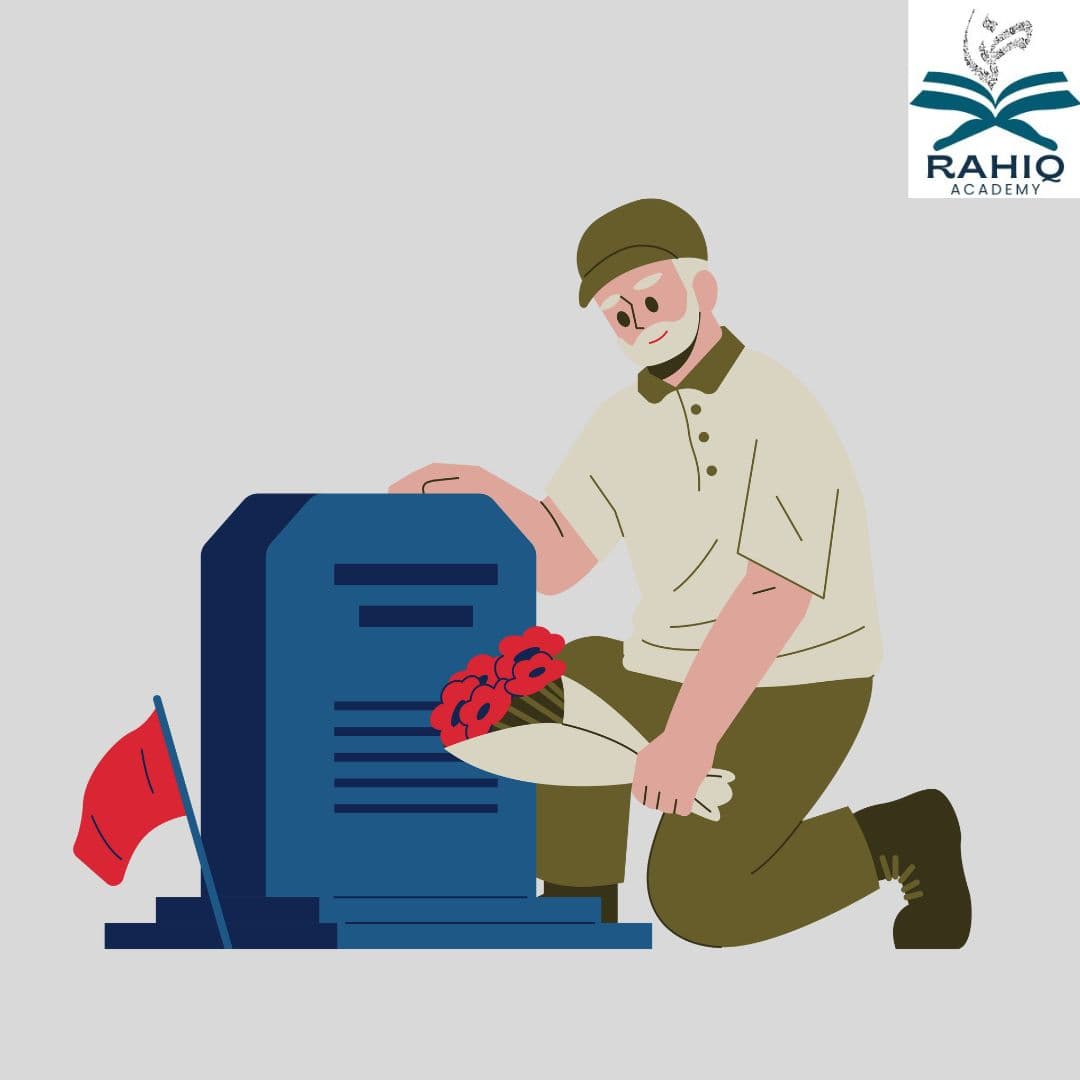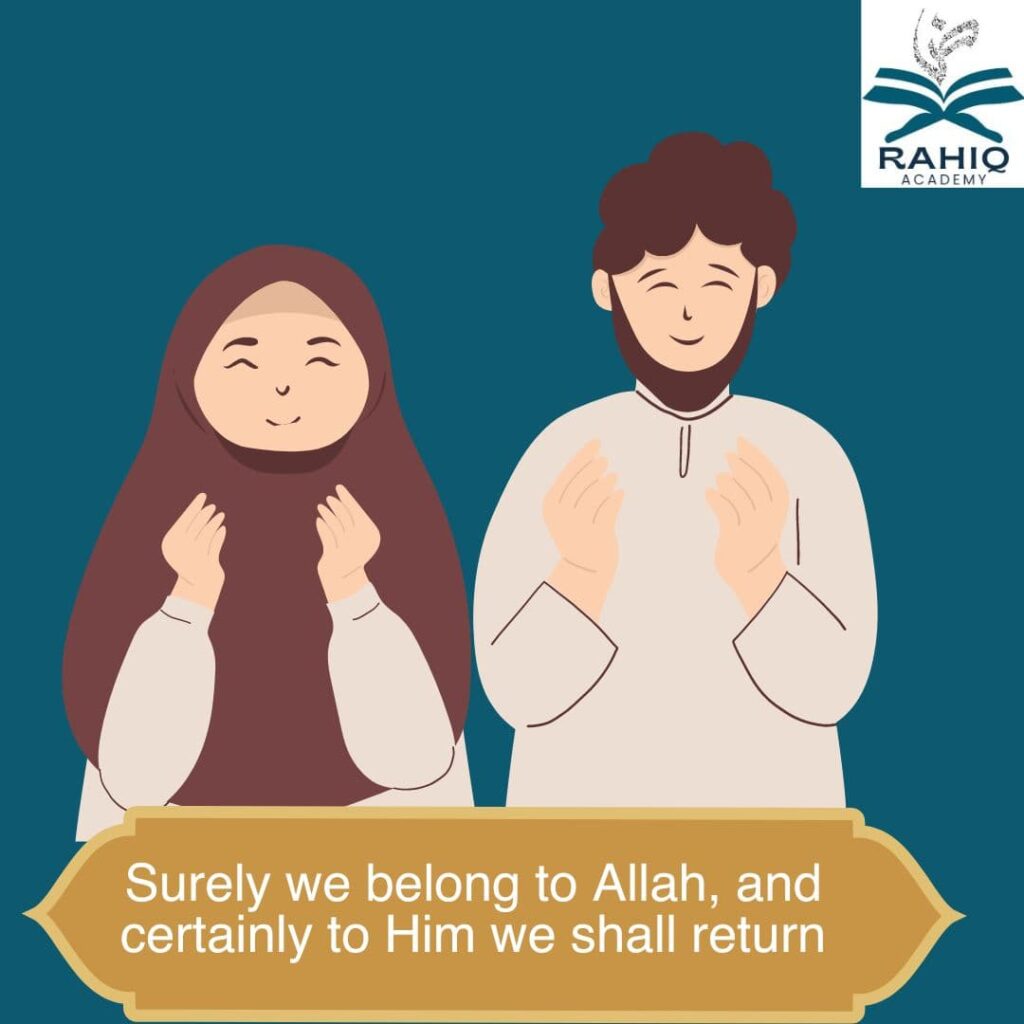Death is an inevitable reality that every living soul must face. As Muslims, we are guided by the teachings of Islam to navigate this profound journey with wisdom, compassion, and faith. When someone passes away, our words and actions hold immense significance, offering solace to the bereaved while upholding the principles of our religion. In this comprehensive article, we will explore the teachings of Islam regarding the appropriate words, supplications, and etiquette, The Best Duas In Islam saying when someone dies to be observed during this solemn occasion.
First thing to say after someone’s death
Upon learning of someone’s demise, the First thing to say after someone’s death are:
“Inna lillahi wa inna ilayhi raji’un”
(Verily, we belong to Allah, and truly to Him shall we return).
This powerful statement, derived from the Qur’an (2:156), serves as a profound reminder of our ultimate return to our Creator. It instills a sense of acceptance and submission to the divine will, acknowledging that death is a temporary separation from this worldly existence.
The Qur’anic verse states: “إِنَّا لِلَّهِ وَإِنَّآ إِلَيْهِ رَٰجِعُونَ”
(Who, when a misfortune overtakes them, say, “Surely we belong to Allah, and certainly to Him we shall return.”) [Qur’an 2:156]
These words serve as a powerful affirmation of our faith and a reminder that our ultimate destination is the eternal realm of Allah, the Most High. By uttering these words, we acknowledge the temporary nature of our existence in this world and submit to the divine will and wisdom that governs all aspects of life and death.
Dua after someone’s death

After expressing the initial statement of faith, it is highly encouraged to supplicate for the deceased’s soul. The Prophet Muhammad (peace be upon him) taught us to recite this dua after someone’s death :
“Allahumma-ghfir lahu/laha, warhamhu/ha, wa’afihi/ha, wa’fu ‘anhu/ha” (O Allah, forgive him/her, have mercy upon him/her, protect him/her, and pardon him/her).
This beautiful dua seeks forgiveness, mercy, and protection for the departed soul, reflecting the compassion and care that Islam extends to those who have left this world.
The Prophet Muhammad (peace be upon him) said:
“مَنْ صَلَّى عَلَى جَنَازَةٍ فَلَهُ قِيرَاطٌ، وَمَنْ شَهِدَهَا حَتَّى تُدْفَنَ فَلَهُ قِيرَاطَانِ، أَحَدُهُمَا أَكْبَرُ مِنَ الْجَبَلِ الْعَظِيمِ”
(Whoever attends a funeral procession will get a reward equal to one qirat, and he who attends the burial will get a reward equal to two qirats, one of which is bigger than the mountain of Uhud.) [Sahih Muslim]
This hadith highlights the significance of offering supplications and attending the burial rites for the deceased, as it is a means of earning immense rewards and demonstrating compassion towards our fellow believers.
Condolence to Say to Someone Who’s Loved One Has Died
When offering condolences to someone who has lost a loved one, it is essential to choose words that provide comfort and solace. The Prophet Muhammad (peace be upon him) taught us to say:
“Inna lillahi ma akhatha, wa lahu ma a’ata, wa kullun ‘indahu bi-ajalin musamman, faltasbir waltahtasib” (Truly, to Allah belongs what He has taken, and to Him belongs what He has given, and everything has an appointed term with Him, so be patient and expect reward from Allah).
These profound words acknowledge the temporary nature of our existence and remind the bereaved to remain patient and steadfast in their faith, trusting in Allah’s wisdom and plan.
The Qur’an states: “﴾157﴿ أُولَٰئِكَ عَلَيْهِمْ صَلَوَاتٌ مِّن رَّبِّهِمْ وَرَحْمَةٌ ۖ وَأُولَٰئِكَ هُمُ الْمُهْتَدُونَ” (Those – upon them are blessings from their Lord and mercy. And it is those who are the [rightly] guided.) [Qur’an 2:157]
This verse assures us that those who exhibit patience and trust in Allah’s decree during times of adversity are indeed guided and will receive blessings and mercy from their Lord.
What to say when Visiting the Graveyard?

When Visiting the Graveyard the final resting place of a loved one, it is encouraged to offer supplications and seek forgiveness on their behalf.
The Prophet Muhammad (peace be upon him) taught us to recite:
“As-salamu ‘alaykum ahla darissalam, amin lillahi minkum wa minna, nas’alullaha lana wa lakumul ‘afiyah” (Peace be upon you, O inhabitants of the dwellings, believers and Muslims, we will follow you, we ask Allah for well-being for us and for you).
This greeting demonstrates respect for the deceased and acknowledges the shared faith that binds us, even in the afterlife.
The Prophet Muhammad (peace be upon him) said:
“إِذَا مَرَرْتُمْ بِقُبُورِ الْمُؤْمِنِينَ فَسَلِّمُوا عَلَيْهِمْ”
(When you pass by the graves of the believers, greet them.) [Sahih Muslim]
This hadith highlights the importance of visiting graveyards and offering salutations to the deceased, as it strengthens the bonds of brotherhood and sisterhood within the Muslim community, even beyond the veil of this world.
The Best Words to Say When Offering Condolences
In addition to the teachings of the Prophet Muhammad (peace be upon him), Islam encourages us to offer sincere words of comfort and support to those grieving.
The Best Words to Say When Offering Condolences:
- “May Allah grant you patience and strength during this difficult time.”
- “Our thoughts and prayers are with you and your family.”
- “The memories of your loved one will forever remain in our hearts.”
- “We are here to support you in any way we can.”
These words, spoken with genuine empathy and compassion, can provide solace and reassurance to the bereaved, reminding them that they are not alone in their grief.
The Qur’an states:
﴾10﴿ وَٱلصَّـٰبِرِينَ فِى ٱلْبَأْسَآءِ وَٱلضَّرَّآءِ وَحِينَ ٱلْبَأْسِ ۗ أُو۟لَـٰٓئِكَ ٱلَّذِينَ صَدَقُوا۟ ۖ وَأُو۟لَـٰٓئِكَ هُمُ ٱلْمُتَّقُون
and who are patient in times of suffering, adversity, and in ˹the heat of˺ battle. It is they who are true ˹in faith˺, and it is they who are mindful ˹of Allah˺.
Dressing respectfully for an Islamic funeral
When attending an Islamic funeral or visiting the bereaved, it is crucial to dress modestly and respectfully. This not only honors the solemnity of the occasion but also demonstrates reverence for the teachings of Islam.
For men, it is recommended to wear loose-fitting, simple clothing that covers the body from the navel to the knees. Women should dress in accordance with Islamic principles of modesty, covering their hair and bodies in a dignified manner.
The Qur’an instructs believers to observe modesty in their attire, as stated:
“﴾31﴿ قُل لِّلْمُؤْمِنِينَ يَغُضُّوا مِنْ أَبْصَارِهِمْ وَيَحْفَظُوا فُرُوجَهُمْ ۚ ذَٰلِكَ أَزْكَىٰ لَهُمْ ۗ إِنَّ اللَّهَ خَبِيرٌ بِمَا يَصْنَعُونَ”
(Tell the believing men to reduce [some] of their vision and guard their private parts. That is purer for them. Indeed, Allah is Acquainted with what they do.) [Qur’an 24:30]
Dressing respectfully for an Islamic funeral adhering to these guidelines serves as a reminder of our commitment to the principles of modesty and purity in all aspects of our lives.
Food as a token of support
In times of grief, it is a beautiful tradition in Islam to offer Food as a token of support family. This act of kindness not only provides practical support but also serves as a symbolic gesture of unity and compassion. Preparing and delivering meals allows the grieving family to focus on their mourning without the added burden of meal preparation.
The Prophet Muhammad (peace be upon him) said:
“مَنْ عَزَّى مُصَابًا فَلَهُ أَجْرٌ مِثْلُ أَجْرِهِ”
(Whoever consoles an afflicted person will receive a reward similar to the reward of the afflicted person.)
This hadith highlights the immense reward associated with providing comfort and support to those who are grieving, including offering practical assistance such as preparing and delivering meals.
Furthermore, the Qur’an encourages believers to be kind and compassionate towards one another, as stated:
“﴾17﴿ إِنَّمَا الْمُؤْمِنُونَ إِخْوَةٌ فَأَصْلِحُوا بَيْنَ أَخَوَيْكُمْ ۚ وَاتَّقُوا اللَّهَ لَعَلَّكُمْ تُرْحَمُونَ”
(The believers are but brothers, so make settlement between your brothers. And fear Allah that you may receive mercy.)
[Qur’an 49:10]
By offering food as a token of support and nourishment to the bereaved family, we not only fulfill a practical need but also strengthen the bonds of brotherhood and sisterhood within the Muslim community, embodying the spirit of compassion and mercy that Islam encourages.
Islam’s teachings on death and mourning, embodied in the concept of Islam saying when someone dies are rooted in compassion, faith, and the recognition of our temporary existence in this world.
By adhering to these guidelines and embracing the wisdom of our religion, we can navigate the profound experience of loss with grace, dignity, and unwavering trust in Allah’s divine plan. May these words and actions bring comfort and solace to those who grieve, reminding them of the eternal bond that connects us all as believers in theone true God.
Additionally, reciting prescribed dua after someone’s death offers a powerful way to express our grief and seek comfort in prayer.
Want to take your Arabic and Quranic studies to the next level?
Explore our comprehensive Online Courses designed for all skill sets!
Visit our Website to learn more, book Your Free Evaluation and enroll today.




